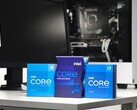We are aware that some retailers across the world are already selling Rocket Lake processors, even if Intel specified that the new models are not to go on sale before March 30. This is also how we got some early unofficial reviews, but it looks like one new feature slipped past everyone. As demonstrated in a post made on the Chinese Chiphell forums, Intel’s Rocket Lake CPUs now support a memory overclocking feature that is very similar to AMD’s Infinity Fabric Clock (FCLK) on the Ryzen 3000 and Ryzen 5000 CPUs.
The Chiphell post specifies that the Rocket Lake processor in question is an Intel Core i7-11700K running on an MSI MEG Z490I Unify motherboard. It is not immediately apparent how the new memory overclocking feature works, but the post shows that the motherboard BIOS lets users select two “gears” for the CPU IMC (integrated memory controller). Gear 1 is 1:1 (synchronous mode), while Gear 2 is ½:1 (asynchronous mode). This second option mirrors the Infinity Fabric Clock (FCLK) on the Ryzen platforms that can be modified to work independent from the unified memory controller clock (UCLK) and the memory clock (MEMCLK). Users can achieve higher memory clocks by fine tuning the FCLK, but they also need to keep track of the higher memory latency that increases with the FCLK clocks.
Most Ryzen 3000 CPUs can run the FCLK in synchronous mode (1:1 ratio) up to 1,800 MHz ( DDR4-3600), with very few “gold” samples hitting FLCK 1,900 MHz (DDR4-3800). Ryzen 5000 ups this limit to a little over 2,000 MHz (DDR4-4000), but there is still some variance among samples. Now, according to the Chiphell post, the 1:1 option for the Rocket Lake CPUs appears to be capped at around 1,866 MHz (DDR4-3733), which is essentially on par with the Ryzen 3000 CPUs. This could be an arbitrary limit, since MSI still has not released an official BIOS update for its Z490 mobos.
In order to demonstrate how memory latency affects different memory clock speeds on the Rocket Lake CPU, the Chiphell user first tested a DDR4-4000 kit with 18-20-20-40 1T timings. Default clocks are above the 1:1 threshold in this case, so the memory needed to be asynchronously overclocked, which led to 61.3 nanosecond latencies in AIDA64. Then, the user tested a DDR4-3600 14-14-14-34 2T kit with uncore clocks set to 4,100 MHz and got 50.2 ns latency.
This DDR4-3733 limit certainly does not look to good compared to AMD’s slightly higher limits on the Ryzen 5000 CPUs, but we should not yet dismiss the possibility of some limited Z490 mobo models. We still need to see how the new Z590 mobos handle this aspect, plus we would like to get a deep dive on this new memory overclocking feature directly from Intel.
Buy the Asus ROG Maximus XIII Hero (WiFi 6E) Z590 motherboard on Amazon















